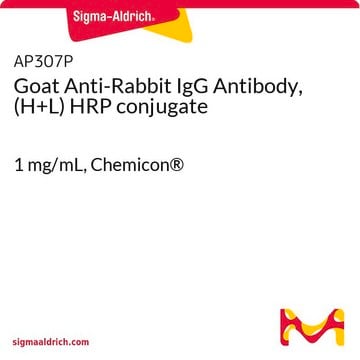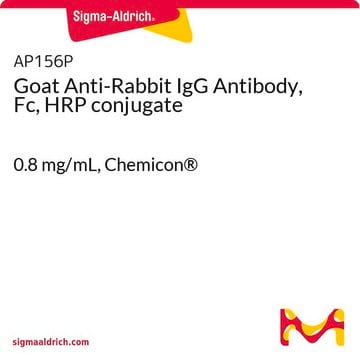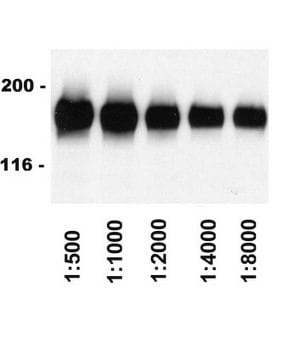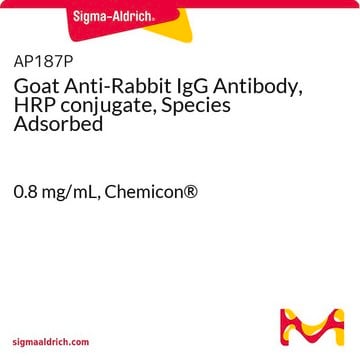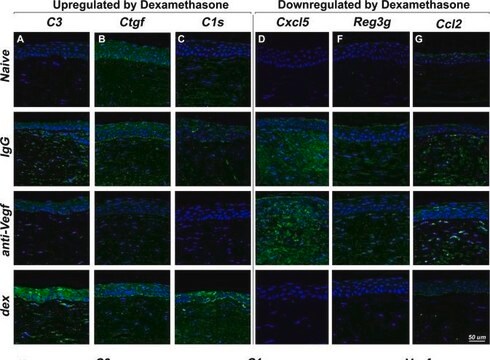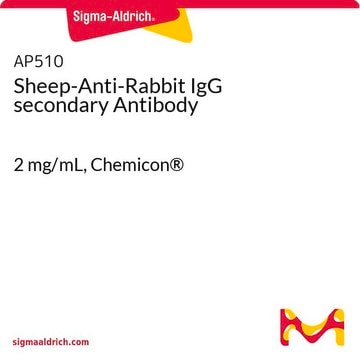推荐产品
生物源
sheep
品質等級
共軛
peroxidase conjugate
抗體表格
purified antibody
抗體產品種類
secondary antibodies
無性繁殖
polyclonal
物種活性
rabbit
製造商/商標名
Chemicon®
濃度
1 mg/mL
技術
western blot: suitable
運輸包裝
wet ice
目標翻譯後修改
unmodified
一般說明
Immunoglobulin G (IgG) is part of the family of glycoprotein immunoglobulins which stage immune responses against pathogenic organisms. IgG contributes to the immune response by mobilizing innate immune effector cells and inducing and pro-inflammatory responses. Such proinflammatory responses are mediated by Fcg receptors which interact with sialylated Fc fragments on IgG molecules. This antibody is processed from Cat. No. AP510, Sheep anti-Rabbit IgG.
特異性
This antibody reacts with rabbit IgG and rabbit IgG (Fc). There may be minimal cross-reactivity against Human IgG and Rabbit IgM, with minimal to no cross-reactivity against Mouse IgG, Rat IgG, Chicken IgY, Guinea Pig IgG, and Hamster IgG.
應用
Sheep Anti-Rabbit IgG Antibody, HRP conjugate validated for use in western blotting.
品質
Evaluated by Western Blot in Rabbit IgG recombinant protein.
Western Blot Analysis: 0.1 µg/mL of this antibody detected Rabbit IgG in 0.5 µg of Rabbit IgG recombinant protein.
Western Blot Analysis: 0.1 µg/mL of this antibody detected Rabbit IgG in 0.5 µg of Rabbit IgG recombinant protein.
標靶描述
~53 kDa observed
外觀
Purified sheep polyclonal in buffer containing PBS, StabilZyme® HRP Conjugate Stabilizer, and 0.05% ProClin 150.
分析報告
Control
Rabbit IgG recombinant protein
Rabbit IgG recombinant protein
法律資訊
CHEMICON is a registered trademark of Merck KGaA, Darmstadt, Germany
StabilZyme is a registered trademark of SurModics, Inc.
Not finding the right product?
Try our 产品选型工具.
訊號詞
Danger
危險聲明
危險分類
Aquatic Chronic 3 - Repr. 1A
水污染物質分類(WGK)
WGK 2
閃點(°F)
Not applicable
閃點(°C)
Not applicable
Jie Zhou et al.
Cell reports, 38(6), 110344-110344 (2022-01-31)
SARS-CoV-2 has a broad mammalian species tropism infecting humans, cats, dogs, and farmed mink. Since the start of the 2019 pandemic, several reverse zoonotic outbreaks of SARS-CoV-2 have occurred in mink, one of which reinfected humans and caused a cluster
Ryan J Bloom et al.
Nature methods, 11(11), 1147-1153 (2014-09-15)
Synthetic genetic circuits incorporating regulatory components based on RNA interference (RNAi) have been used in a variety of systems. A comprehensive understanding of the parameters that determine the relationship between microRNA (miRNA) and target expression levels is lacking. We describe
Ecco Staller et al.
The Journal of general virology, 102(9) (2021-09-16)
Viruses require host factors to support their replication, and genetic variation in such factors can affect susceptibility to infectious disease. Influenza virus replication in human cells relies on ANP32 proteins, which are involved in assembly of replication-competent dimeric influenza virus
Yurika Matsui et al.
DNA and cell biology, 38(1), 91-106 (2018-11-22)
The considerable amount of experimental evidence has defined the Hippo pathway as a tumor suppressive pathway and increased expression and/or activity of its oncogenic effectors is frequently observed in cancer. However, clinical studies have failed to attribute cancer development and
Bhakti Mistry et al.
Journal of virology, 94(3) (2019-11-07)
The avian-origin influenza A virus polymerase is restricted in human cells. This restriction has been associated with species differences in host factor ANP32A. Avian ANP32A supports the activity of an avian-origin polymerase. However, the avian-origin polymerase is incompatible with human
我们的科学家团队拥有各种研究领域经验,包括生命科学、材料科学、化学合成、色谱、分析及许多其他领域.
联系技术服务部门
